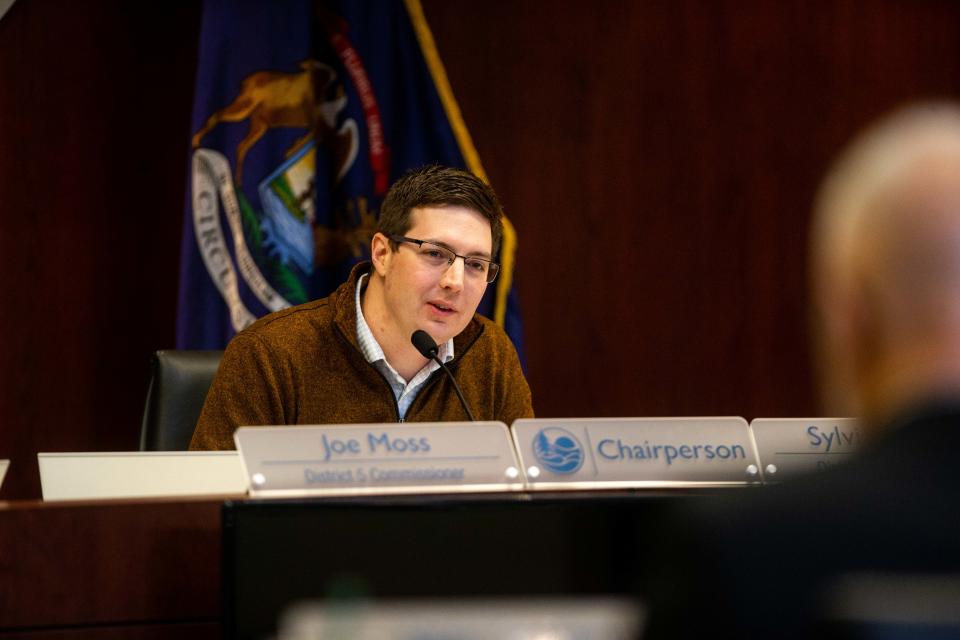Resident alleges Hudsonville school board members violated Open Meetings Act
- Oops!Something went wrong.Please try again later.
HUDSONVILLE — A Hudsonville resident has filed a complaint with the Michigan State Attorney General’s Office claiming school board members, some affiliated with far-right group Ottawa Impact, violated the Open Meetings Act.
More: Texts show Ottawa Impact officials orchestrated law firm change before taking office
More: AG: Ottawa Impact violated spirit of OMA, stronger transparency laws needed
In an email sent to Attorney General Dana Nessel’s office on Monday, March 27, the resident said four members of the Hudsonville School Board violated OMA, which prohibits decision-making outside of the public view.
The resident obtained the text messages and emails cited in the email, which she shared with The Sentinel, through a Freedom of Information Act request. Nessel's office did not respond to an email or phone call from The Sentinel by publication deadline.
The records show incumbents Barb Hooper and Mark Davis and newcomers Greg Chanski and Nick Bolhuis communicating privately between Dec. 12 and Jan. 19, discussing their plans for board chair and how each person should vote in order to secure a controlling majority on the seven-member board.
The board had its first organizational meeting Jan. 19, but all three of November's re-elected or elected members — Hooper, Chanski and Bolhuis — signed acceptance of their oaths of public office on Nov. 28.
The Open Meetings Act requires public bodies to hold public meetings if a quorum — the minimum number of members required to make a decision valid — is present. In addition, OMA says any decisions or discussions on matters that could pertain to a decision must also be conducted in a public meeting.
“As evidenced by the attached text message communications, these conversations illustrating their plan to vote for each other for board member officer positions for the Jan. 19 board meeting clearly fall into the category of a ‘consensus-building process that equates to decision-making,’” the resident wrote in her complaint.
She cited the Open Meetings Handbook, which says if “board members use telephone calls or sub-quorum meetings to achieve the same intercommunication that could have been achieved in a full board or commission meeting, the members' conduct is susceptible to ‘round-the-horn’ decision-making, which achieves the same effect as if the entire board had met publicly and formally cast its votes. A ‘round-the-horn’ process violates the OMA.”
The messages begin Dec. 12, with Bolhuis texting Hooper: “Are you ready to be President (smiley face emoji)?”
“I don’t know,” Hooper responded. “I’m a bit nervous. I also think you would make a great President.”
“Greg, Andrew and I shouldn’t be yet. We’re too fresh,” Bolhuis texted back. “Depending on the extra workload, I would be willing to consider VP if you are President.”
“You would be very good. I just need support of the board,” Hooper responded. “It’s just been Mark and I and everything has been a battle with (Superintendent) Doug (VanderJagt). (Former Board President) Ken (Hall) agrees with everything he says and won’t rock the boat. Ken can stop having RULER (sic) on the agenda for Thursday.”
“It will be different come January,” Bolhuis texted back.
“Yes,” Hooper responded.
Messages between Chanski and Hooper on Jan. 6 show Chanski saying, “You and Nick would make an excellent team” and Hooper responding the next day: “I thought you wanted to be VP??? Thank you for your confidence.”

Chanski also communicated with Bolhuis on Jan. 7, outlining how the nomination process would unfold during the first meeting of the year.
“Spoke with Barb and she is excited that you are up for VP,” Chanski texted. “Mark will nominate Barb for President and then someone will nominate you. (Four) votes are required and the votes are with us.”
Hall, who was still board president prior to Jan. 19, sent an email to all board members Jan. 15, reminding them that “decisions on officers cannot be made prior to the meeting,” and asked VanderJagt and staff to send the members “the script for the nomination process to board members before the meeting. This will allow members to understand the process.”

Despite the reminder, Davis emailed Hooper on Jan. 16, saying: “I’m prepared to nominate you for president. I trust you’ll accept. We need a change.”
“You are going to need to be quick nominating me on Thursday,” Hooper responded. “Nick called me tonight and Doug (VanderJagt) called him today and Nick felt like he was ‘fishing’ and asked about officer positions. … Nick thinks Dawn (Sneden) will be nominating Ken right away. I told Nick (that) Doug’s phone call was totally inappropriate. He is obviously worried.”
On Jan. 17, Chanski texted Bolhuis: “Mark will be nominating Barb for President. I will be nominating Nick for VP. Mark will nominate Greg for Finance. Remember to vote for yourself. End of story.”

"By communicating their voting intentions through text messages, to the point of copying and pasting messages to individuals, it is clear board members Greg Chanski, Barb Hooper, Mark Davis, and Nick Bolhuis have violated the Open Meetings Act of 1976 by conspiring and circumventing the public body in this decision," the resident wrote in her complaint.
The release of the messages seems to contradict assurances that Hooper, Chanski and Bolhuis made at the Jan. 19 meeting about transparency.
“We will be very transparent,” Hooper said after being elected board president. “There will be no added agenda items, unless (Superintendent Doug) VanderJagt brings something forward, as he occasionally does, as it's emergent.”
More: Hudsonville school board pledges transparency after public raises concerns
More: 'Essentially we were lied to': Allendale School Board member demands recision of law firm vote
The concerns came after more than 100 community members attended the meeting, some worried about board members' potential affiliation with Ottawa Impact.
Ottawa Impact is an upstart political group borne from clashes over the county’s COVID-19 mitigation mandates in 2020. Its founders, Moss and Board Vice Chair Sylvia Rhodea, were unsuccessful in suing the previous board of commissioners and the county's former health officer.
In response, they targeted seats on the board in 2022, recruiting like-minded candidates who agreed “traditional Republicans” weren’t enforcing true conservative policies. They successfully defeated enough incumbents in the August primary to secure a majority on the 11-member county board of commissioners and hold a majority on the Allendale Public Schools Board of Education.

Hooper, Chanski and Bolhuis were listed as “parent picks” by OI, but weren't “vetted” or funded by the Ottawa Impact PAC. The three campaigned together with shared signs and identical values, many similar to those of OI candidates, on their campaign websites.
The group did receive support from the PAC "Education Excellence in HPS." Moss made a small donation, $25, to the PAC during the campaign cycle.
“While these are candidates that campaigned on transparency and accountability, their actions indicate they are willing to continue conspiring and communicating outside of the law on other decisions in the future,” the resident wrote in her complaint.
A similar scenario played out in Allendale Public Schools in late January when, at that school board's first meeting of the year, new Ottawa Impact-affiliated members fired its longtime legal counsel in favor of Lansing-based Kallman Legal Group.
More: 'Essentially we were lied to': Allendale School Board member demands recision of law firm vote
Less than a week later, The Sentinel reported the newly elected OI members of the board methodically arranged through emails and text messages for KLG to take over legal services for the district nearly six weeks before the candidates were sworn into office.
The communications were obtained through a Freedom of Information Act request filed by an Ottawa County resident, who shared it with The Sentinel.
The county board followed a similar script days earlier. On Jan. 3, after swearing eight new candidates into office, several agenda items were added with no notice and sweeping changes were made, including:
Firing former administrator John Shay and hiring former Republican congressional candidate John Gibbs
Eliminating the county's Diversity, Equity and Inclusion Office
Changing the county motto from "Where You Belong" to "Where Freedom Rings"
Firing former corporate counsel Doug Van Essen and replacing him with KLG
The Michigan Attorney General's Office announced Jan. 4 it would investigate the county board's first meeting and evaluate if the group violated the state's Open Meetings Act.
After a nearly six-week review, Nessel announced Feb. 16 that, although the OI commissioners' conduct was a “blatant violation of the public’s trust and the tenets of government transparency,” it didn't technically violate state law.
Nessel planned to urge state lawmakers to view Ottawa County as a reason to strengthen "sunshine laws," which include OMA and the state's Freedom of Information Act.
"There’s no question that there were things that occurred involving this county commission that were really disturbing,” Nessel told The Sentinel.
Nessel noted Ottawa County residents could still pursue legal action, which could set new precedent for what commissioners can and can't do before taking office.
One citizen group did just that and filed a lawsuit March 8, alleging the Ottawa Impact majority violated OMA at its inaugural meeting.
Subscribe: Receive unlimited digital access to your local news coverage
The suit seeks to nullify the decisions made by the board Jan. 3, arguing Ottawa Impact commissioners were a de facto public body and required to adhere to OMA beginning Nov. 9 — the day after the general election — because, during that period, they:
Constituted a majority and quorum of the incoming board
Performed government functions by meeting and communicating in-person or electronically to deliberate and make decisions on public policy
Exercised government authority by directing Ottawa County employees to carry out their decisions — orders that were obeyed
A hearing on that lawsuit had not been scheduled as of publication time.
— Sarah Leach is executive editor of The Holland Sentinel. Contact her at sarah.leach@hollandsentinel.com. Follow her on Twitter @SentinelLeach.
This article originally appeared on The Holland Sentinel: Resident: Hudsonville school board members violated Open Meetings Act

